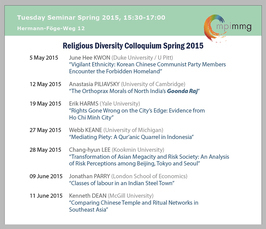"The Orthoprax Morals of North India’s Goonda Raj"
Religious Diversity Colloquium Spring 2015
- Datum: 12.05.2015
- Uhrzeit: 15:30 - 17:00
- Vortragende: Anastasia Piliavsky (University of Cambridge)
- Anastasia Piliavsky is a social anthropologist who works on Indian politics and crime, and the relation between the two. Trained at Boston University and at Oxford, she is Fellow and Director of Studies in Social Anthropology at Girton College, Cambridge; she is also currently a co-Inversitagor on an international study of democracy and political criminalisation in India, Pakistan and Bangladesh (funded by the European and the British Research Councils). She has written historically and ethnographically on India‘s criminal tribes, borders, secrecy, publicity, corruption and the police, and has recently edited a book on Patronage as Politics in South Asia (CUP 2014).
- Ort: MPI-MMG, Hermann-Föge-Weg 12, Göttingen
- Raum: Conference Room

For more details please contact vdvoffice(at)mmg.mpg.de.
This lecture examines the morals of goonda raj in northern India, or why so many people here prefer bruisers as their political leaders. I argue that goondas win popular favour less by coercion than by appeals to the value placed on actions and their efficacy: what I term the ‘orthoprax morals’ concerned with assessing the contextual correctness and effective power of conduct rather than the noetics of self. Challenging the viability of ‘virtue ethics’ as a general theory for the anthropology of moral life, I argue that a cross-cultural examination of morals must proceed from the delineation of moral jurisdictions in a given culture, not from assertions of a single and culturally peculiar moral jurisdiction of ‘the self’. I further suggest that questions of value, central to French sociology from Durkheim to Dumont, address just this problem, helping to pinpoint those spheres of life which people in different cultures find morally valuable and see as appropriate loci of moral judgment.